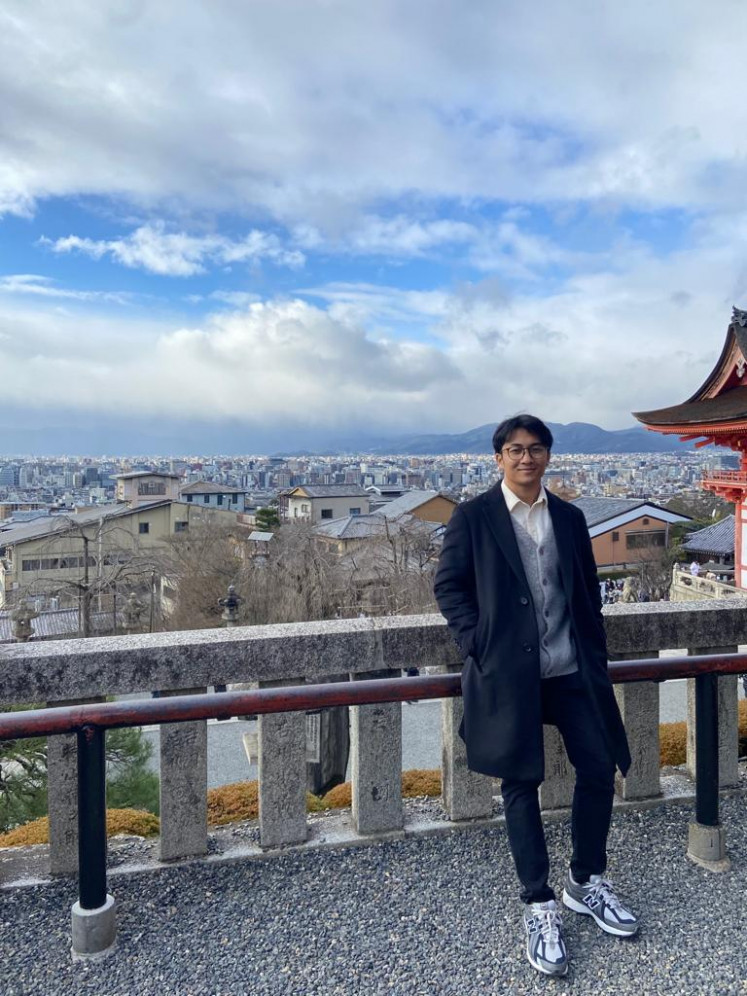Popular Reads
Top Results
Can't find what you're looking for?
View all search resultsPopular Reads
Top Results
Can't find what you're looking for?
View all search resultsExtra work, less fun: Indonesian students talk surviving inflation abroad
Indonesian students abroad share how to manage their finances while readying for inflation.
Change text size
Gift Premium Articles
to Anyone
T
he recent high inflation is often blamed on the wide gap between the supply and demand for goods and services, a problem that the conflict between Russia and Ukraine has aggravated. The disruption caused by the war has led to an increase in energy and commodity prices, leading to a rising inflation.
The former chief economist of the International Monetary Fund, Maurice Obstfeld, said a recession was “extremely unlikely,” as The Jakarta Post reported. This is due to China’s recent reopening, which has paved the way for a faster recovery.
Obstfeld added that the world could not afford to lower its guard, explaining that there was no guarantee for an economic recovery this year. Global inflation is expected to fall by 6.6 percent in 2023 and 4.3 percent in 2024, as reported by the IMF, which is still above the pre-pandemic level.
Students from Indonesia discuss their strategies for handling money while studying abroad.
Hustle
Some international students have chosen a “side hustle” to support their lifestyle.
Doctoral student Sri Rahayu said she could make ends meet by working extra hours at a café for 10 hours a week at an hourly rate of A$27 (US$19.30). This is on top of her work as a student support officer and her responsibilities as a student.
Puji, who lives in Australia with her husband and sons, said she constantly worries of being unable to manage her time between her studies and work effectively.
She noted that her rent had increased by 16.67 percent to A$1,400 a few months ago. As a scholarship recipient she needs to watch her spending closely because the money she makes is just enough for her family to “barely survive” in Australia.
“A$2,200 I think is enough for myself, but not as a family,” Puji, currently pursuing a major in education in the Australian capital, said.
According to a recent article in Forbes, the Australian Bureau of Statistics (ABS) announced that Australia’s annual inflation rate rose 7.8 percent in the 12 months ending in December 2022. Quarterly inflation increased by 1.9 percent, reaching its highest level since 1990.
Puji is not the only one faced with an extraordinary rise in accommodation. Rent has also increased in other major cities, including Sydney and Melbourne. Apartment rents in Haymarket, Rosebery, Ultimo and Pyrmont, the epicenters for international students, have risen by around 30 percent over the past year, according to Macro Business.
Additional skills: Kresna, an undergraduate student in Japan, shares that additional skills such as language can be key to finding more opportunities. (Courtesy of Kresna Rezdianza Warganegara) (Archive/Courtesy of Kresna Rezdianza Warganegara)Kresna Rezdianza Warganegara earns extra income by teaching English to Japanese white-collar workers in Tokyo despite still receiving full financial support from his parents.
The fourth-year undergraduate student would often charge a fee of 1,200 yen ($9.34) per hour, which he thought was a blessing because it allowed him to teach 6 to 10 hours per week.
The 21-year-old revealed that the situation has not deeply affected him due to the yen’s depreciation over the last two years.
“Therefore, even though costs are rising in this area, it’s sort of mediated a little bit by that [yen’s depreciation],” Kresna said. He has more than 10 students under his tutorship.
Budgeting is key
Some students say that maintaining careful budgeting is vital to surviving inflation overseas.
Yusteja, who now resides in the United Kingdom, would spend no less than 2,000 pounds ($2,477.79) on accommodation.
Forbes stated that the latest numbers from the Office of National Statistics (ONS) show that UK inflation dropped somewhat to 10.5 percent in the year to December 2022, down from 10.7 percent recorded a month earlier. But still, the living cost in the UK is considerably high. According to Friends International, even the price of pasta, a staple meal for students trying to save money, has increased by 50 percent in the last year.
When Yusteja first arrived in the country, he had trouble settling his family into a home that would accommodate them. Therefore, the 36-year-old had to be astute enough to locate a suitable dwelling within the family’s financial means.
Yusteja mentioned that they save a lot of money by cooking their meals. A family of three can spend 30 pounds on dinner at a fast food restaurant, but the same amount on groceries would provide enough food for four or five days.
While living in the UK, Yusteja received a government incentive of 67 pounds, yet, he found that cutting back on expenses was exceptionally helpful. A regular family outing involves a trip around the local park or the nearby free entertainment area such as Lively Bristol; the central city is famous for its port and Banksy murals.
“That’s my way of keeping my child happy,” he said.
Yusteja has also reduced the transportation budget. His family would walk within a distance of 3.2 kilometers, as it would save up at least 6.2 pounds.
Extra hours: Puji, a mother of three who is completing her PhD in Canberra, reveals that she makes ends meet to provide for her family. (Courtesy of Puji Sri Rahayu) (Archive/Courtesy of Puji Sri Rahayu)Meanwhile, Puji has also disclosed an analogous approach to handling her finances while living in Australia. Puji stopped buying expensive lattes and coffees from the café near campus to save money. The mother of two would treat herself to a coffee or chai latte once or at the most twice a week.
“I have to calculate the rent and carefully allocate the needed expenses. We cut down expenses on snacks,” Puji said.
Faiq Windrasto, currently pursuing an engineering major in the United States, added that shopping for the “home brands” a particular retailer offers is the best way to save money.
The 22-year-old said he had been looking for work to help support himself financially and that the recent inflation made it harder for him to secure employment.
“Besides the massive layoffs, it’s also our visa. There’s no hope for overseas students to acquire a job here,” Faiq said. A recent article by Forbes estimated that as of January 2023 the US would have laid off over 81,000 workers.
“If you are wise enough not to spend money on nonessential goods, you’re good,” Kresna said.













